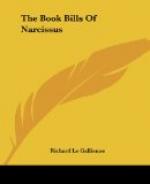Dear little plump, vegetable-marrow Alice! Will Narcissus ever forget that Sunday night when the church, having at last released its weary worshippers, he stole, not as aforetime to the soft side of Emily, but to the still softer side of the little bewildered Alice. For, though Alice had worshipped him all the time, and certainly during the whole of the service, she had never dared to hope that he would pass her dashing, dark-eyed sister to love her—little, blonde, phlegmatic, blue-eyed Alice.
But Apollo was bent on the capture of his Daphne. Truth to say, it was but the work of a moment. The golden arrow was in her heart, the wound kissed whole again, and the new heaven and the new earth all arranged for, in hardly longer time than it takes to tell.
In youth the mystery of woman is still so fresh and new, that to make a fuss about a particular woman seems like looking a gift-horse of the gods in the mouth. The light on the face of womanhood in general is so bewilderingly beautiful that the young man literally cannot tell one woman from another. They are all equally wonderful. Masculine observation leads one to suppose that woman’s first vision of man similarly precludes discrimination.
Ah me! it is easy to laugh to-day, but it was heart—bleeding tragedy when those powers that oughtn’t to be decreed Alice’s exile to a boarding-school in some central Africa of the midland counties.
The hemorrhage of those two young hearts! But, for a time, each plastered the other’s wounds with letters—dear letters—letters every post. For the postal authorities made no objection to Narcissus corresponding with two or more maidens at once. And it is only fair to Alice to say, that she knew as little of the Miller’s Daughter as the Miller’s Daughter knew of her.
So, when Narcissus was reciting Endymion to his Miller’s Maid, it was not without a minor chord plaining through the major harmonies of the present happiness; the sense that Alice was but fifteen miles away—so near she could almost hear him if he called—only fifteen miles away, and it was a long three months since they had met.
It now becomes necessary to admit a prosaic fact hitherto concealed from the Reader. Narcissus rode a bicycle. It was, I must confess, a rather ‘modern’ thing to do. But surely the flashing airy wheel is the most poetical mode of locomotion yet invented, and one looks more like a fairy prince than ever in knickerbockers. Whenever Narcissus turned his gleaming spokes along some mapped, but none the less mysterious, county—road, he thought of Lohengrin in his barge drawn by white swans to his mystic tryst; he thought of the seven-leagued boots, the flying carpet, the wishing-cap, and the wooden Pegasus,—so called because it mounted into the clouds on the turning of a peg. As he passed along by mead and glade, his wheel sang to him, and he sang to his wheel. It was a daisied, daisied world.




